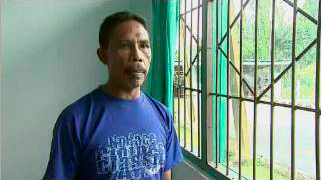
Johan Teterissa is that forgotten prisoner in a dark cell who needs the Amnesty candle. The Indonesian elementary school teacher was recently transferred to Batu Prison on Nusakambangan Island in Indonesia, which is even further away from family and friends in Maluku.
His family couldn’t see the cuts bleeding from being beaten with electric cables upon his arrival at Batu Prison.
In June 2012 Amnesty International received credible information that he and other prisoners at Madiun Prison did not have adequate access to clean drinking water. The prison authorities were also limiting the amount of water available to Johan and other prisoners for bathing.
What was his crime? Johan is serving a 15-year sentence for peacefully unfurling the banned regional flag, the “Benang Raja,” at the end of a dance performed for President Susilo Bambang Yudhoyono during a ceremony in Ambon, Maluku. The police escorted twenty-two activists, including Johan, off the field. Once out of sight of the president, the police beat the activists, forced them to crawl on their stomachs over hot asphalt, and forced billiard balls into their mouths. Johan has never received adequate medical care for his injuries. Prison authorities turned away an independent doctor who tried to see him in July 2010.
Being the mastermind behind the unfurling, Johan was originally sentenced to life in prison. The judges said his actions “embarrassed the people of Indonesia in the eyes of the world”.
There are at least 100 people currently imprisoned for peaceful political protests or for possessing, raising or waving the pro-independence flags of Maluku and Papua in Indonesia. A significant increase in these types of arrests occurred after authorities issued government Regulation No. 77/2007. The regulation prohibits the display of regional logos or flags which are also used by separatist organizations.
In 2008 the UN Working Group on Arbitrary Detention (WGAD) declared Johan Teterissa’s detention to be arbitrary on the grounds that he was imprisoned for the exercise of his rights to freedom of expression and peaceful assembly. These rights are guaranteed in both the Indonesian Constitution and the International Covenant on Civil and Political Rights (ICCPR), to which Indonesia is a state party.
Johan Teterissa is the isolated and abused prisoner that Indonesia seeks to hide from the world.
Please tell the government of Indonesia that we’re lighting a candle in Johan’s cell.
Claudia Vandermade, Amnesty International USA Southeast Asia Coordinator, contributed to this post.
